|
|
|
Sort Order |
|
|
|
Items / Page
|
|
|
|
|
|
|
| Srl | Item |
| 1 |
ID:
072959
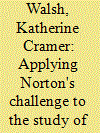

|
|
|
|
|
| Publication |
2006.
|
| Summary/Abstract |
In 95 Theses Anne Norton picks a fight with conventional political science. She asks conventional political science to use different measures (indeed, conceptualize what we do as something other than "measuring"), use different methods, and ask different questions. Some may read this as a threat to an entire way of life. I read it as an intriguing and exciting challenge. a
|
|
|
|
|
|
|
|
|
|
|
|
|
|
|
|
| 2 |
ID:
122785
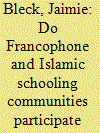

|
|
|
|
|
| Publication |
2013.
|
| Summary/Abstract |
Despite strong empirical evidence of the influence of religious brokers on political mobilisation in Africa, we know very little about the individual-level relationship between religious association and political behaviour. Drawing upon an emerging comparative literature on the effect of social service provision on political participation, this article asks whether Malian consumers of Islamic schooling are as likely to seize new democratic opportunities for electoral participation as their peers who send their children to public schools. Using an original survey of 1,000 citizens, exit polling and interviews, this analysis demonstrates that parents who enrol their children in madrasas are less likely than other respondents to report voting. Conversely, parents who send their children to public schools are more likely to participate in electoral politics.
|
|
|
|
|
|
|
|
|
|
|
|
|
|
|
|
| 3 |
ID:
119199
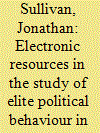

|
|
|
|
|
| Publication |
2013.
|
| Summary/Abstract |
The objective of this article is to survey the abundance of primary source electronic data, and appropriate methods, which could be used to advance the study of elite politics in Taiwan. Research on public attitudes and voting behaviour has benefited enormously from open scholarly access to systematically collected, reliable data resources. Research on elite political behaviour in Taiwan could similarly benefit from the creation of supplementary datasets derived from electronic primary sources. I argue that the primary resources and methods needed are already in place, for instance, to produce quantitative estimates of the policy preferences and ideological positions of parties and individual political actors over time. A variety of political texts created by political actors at all levels of office (and indeed, in opposition) are readily accessible online. With a small degree of processing, these electronic texts can easily be rendered in machine-readable format for analysis by means of computer-assisted content analysis software. Despite successes in other contexts, these data and methods are currently underutilized in studies of elite political behaviour in Taiwan.
|
|
|
|
|
|
|
|
|
|
|
|
|
|
|
|
| 4 |
ID:
031320
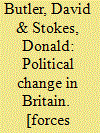

|
|
|
|
|
| Publication |
London, Macmillan, 1969.
|
| Description |
xi,516p
|
|
|
|
|
|
|
|
|
|
|
|
Copies: C:1/I:0,R:0,Q:0
Circulation
| Accession# | Call# | Current Location | Status | Policy | Location |
| 004807 | 324.0942/BUT 004807 | Main | On Shelf | General | |
|
|
|
|
| 5 |
ID:
034487
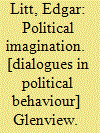

|
|
|
|
|
| Publication |
Glenview, Scott, Foresman and Co., 1966.
|
| Description |
532p.
|
| Series |
Dialogues in politics and political behaviour
|
|
|
|
|
|
|
|
|
|
|
|
Copies: C:1/I:0,R:0,Q:0
Circulation
| Accession# | Call# | Current Location | Status | Policy | Location |
| 000793 | 320.5/LIT 000793 | Main | On Shelf | General | |
|
|
|
|
| 6 |
ID:
116870
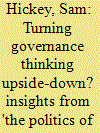

|
|
|
|
|
| Publication |
2012.
|
| Summary/Abstract |
Mainstream thinking within international development around what constitutes 'pro-poor' forms of politics is increasingly at odds with the growing evidence-base on the politics of development. Ideological bias towards Weberian modes of governance and rational actor models of political behaviour, and a growing belief in the power of 'evidence-based policy making' fail to reflect the extent to which informal and patronage-based forms can sometimes play a positive role in enabling poverty reduction, as well as the fact that political elites respond to a wider range of incentives than commonly assumed, including a role for political ideology and discourse rather than evidence per se. These findings offer further support for a fundamental rethinking around the role of politics in shaping development.
|
|
|
|
|
|
|
|
|
|
|
|
|
|
|
|
| 7 |
ID:
131694


|
|
|
|
|
| Publication |
2014.
|
| Summary/Abstract |
'Naming and shaming' those accused of abuse and misconduct is one of the most common strategies of transnational activists. Yet both qualitative and quantitative studies show that the policy and behavioural effects of naming and shaming are often contradictory. Named and shamed actors do respond at least partially by adjusting their policies and behaviour to some extent, but the actions challenged publicly as human rights violations may not cease and can even become more widespread. This ambivalent outcome is usually explained by the uneven capacity of the target to reform or by its 'strategic' response to escape the consequences of naming and shaming. By contrast, I show that naming and shaming can be brought to a standstill when the frame used by transnational activists is ambiguous. I trace the role of framing ambiguity during the Human Rights Watch (HRW) 'naming and shaming' campaigns against the Israel Defence Force (IDF) in the course of the July-August 2006 Israel-Hezbollah war (Lebanon war), and the December 2008-January 2009 Israel-Hamas war (Gaza war). I argue that HRW's use of International Humanitarian Law (IHL) as a frame led to an argumentative deadlock (frame implication contest). This legal frame, and the process of legal framing, did genuinely constrain the IDF, affecting its operations and behaviour. However, the ambiguity of the frame also provided the IDF with a range of material and ideational assets that gave it scope to claim that its actions were actually in conformity with applicable law, and to justify continuing to use force in densely populated areas.
|
|
|
|
|
|
|
|
|
|
|
|
|
|
|
|
| 8 |
ID:
126999
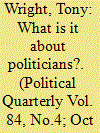

|
|
|
|
|
| Publication |
2013.
|
| Summary/Abstract |
Why do people dislike politicians and could anything be done about it? Drawing upon survey evidence, it is argued that the twin charge against politicians is that they are engaged in a kind of game and that they are a political class out of touch with real life. These charges are examined and found to have at least some merit. Remedies would involve a change in political behaviour; and measures to widen political recruitment. The consequences of not making such changes will be a further erosion of political trust. Constitutional change is less important in tackling dislike of politicians than alterations in political behaviour.
|
|
|
|
|
|
|
|
|
|
|
|
|
|
|
|
|
|
|
|
|